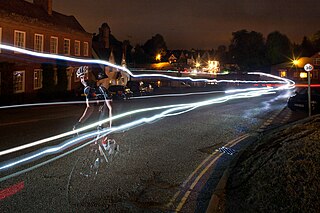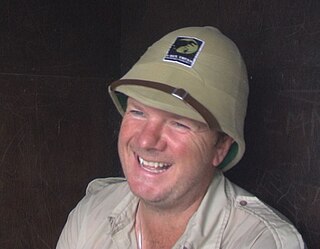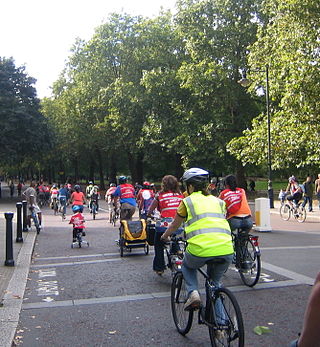
Wandsworth is a London borough in South West London, England. It forms part of Inner London and has an estimated population of 329,677 inhabitants. Its main named areas are Battersea, Balham, Putney, Tooting and Wandsworth Town.
London to Brighton refers to a variety of races, tours, charity bicycle rides and rallies that take place between London and Brighton in the United Kingdom.

Young Lives vs Cancer, the operating name for "CLIC Sargent", is a charity in the United Kingdom formed in 2005. Young Lives vs Cancer is a leading UK cancer charity for children, young people and their families. Its care teams provide specialist support across the UK.

Anthony Nolan is a UK charity that works in the areas of leukaemia and hematopoietic stem cell transplantation. It manages and recruits donors to the Anthony Nolan Register, which is part of an aligned registry that also includes the Welsh Bone Marrow Donor Registry, NHS Blood and Transplant's British Bone Marrow Registry and Deutsche KnochenMarkSpenderdatei (DKMS) UK. This aligned register is known as the Anthony Nolan & NHS Stem Cell Registry. It also carries out research to help make bone marrow transplants more effective.

The Dunwich Dynamo is an annual semi-organised, through-the-night bicycle ride from London Fields park in Hackney, London, England to Dunwich on the Suffolk coast. The distance is approximately 112 miles (180 km).

Lloyd Scott, MBE is an English former professional football goalkeeper and charity fundraiser, best known in the UK for his charity marathons. He is notable for competing in the 2002 London Marathon in a deep-sea diving costume. In 2003 Scott also completed the world's first underwater marathon in Loch Ness and in 2004 cycled a Penny Farthing across Australia. In 2020, between Covid-19 lockdowns, he completed the 3 Peaks Challenge wearing his deep-sea diving suit.

A cyclosportive, or often simply sportive, is a short to long distance, organised, mass-participation cycling event, typically held annually. The Italian term Gran Fondo is commonly used for these events in the United States, Australia and some other English-speaking countries.

Land's End to John o' Groats is the traversal of the length of the island of Great Britain between two extremities, in the southwest and northeast. The traditional distance by road is 874 miles (1,407 km) and takes most cyclists 10 to 14 days; the record for running the route is nine days. Off-road walkers typically walk about 1,200 miles (1,900 km) and take two or three months for the expedition. Signposts indicate the traditional distance at each end.

Geoffrey Robert Thomas is an English former footballer, who won nine caps for the full England team and captained Crystal Palace to the FA Cup final in 1990. He is the Founder of the Geoff Thomas Foundation, a charity that raises funds to fight cancer, a disease from which Thomas has suffered.

Sport Relief was a biennial charity event from Comic Relief, in association with BBC Sport, established in 2002.

Blood Cancer UK, is a UK-based charity dedicated to funding research into all blood cancers including leukaemia, lymphoma and myeloma, as well as offering information and support to blood cancer patients.

Cycling is a popular mode of transport and leisure activity within London, the capital city of the United Kingdom. Following a national decline in the 1960s of levels of utility cycling, cycling as a mode of everyday transport within London began a slow regrowth in the 1970s. This continued until the beginning of the 21st century, when levels began to increase significantly—during the period from 2000 to 2012, the number of daily journeys made by bicycle in Greater London doubled to 580,000. The growth in cycling can partly be attributed to the launch in 2010 by Transport for London (TfL) of a cycle hire system throughout the city's centre. By 2013, the scheme was attracting a monthly ridership of approximately 500,000, peaking at a million rides in July of that year. Health impact analyses have shown that London would benefit more from increased cycling and cycling infrastructure than other European cities.
RideLondon is an annual festival of cycling held in London. Intended as an annual legacy of the London 2012 Olympic and Paralympic Games, it was first held in 2013. The festival consists of a series of cycling events on closed roads around London and Essex.

A century ride is a road cycling ride of 100 kilometers or more in metric system countries or 100 miles or more in imperial system countries, usually as a cycling club-sponsored event. Many cycling clubs sponsor an annual century ride as both a social event for cyclists and as a fund-raiser for the club’s other activities.
Pelotonia is an organization of events, centered around a two-day bicycle ride in the Columbus, Ohio area, to raise funds for cancer research at the Ohio State University Comprehensive Cancer Center – The James. Pelotonia, the Ride, includes a weekend of cycling, entertainment and volunteerism. As a 501(c)(3) not-for-profit organization, Pelotonia facilitates all of riders' and fundraisers' donation money contributing to cancer research, while corporate and philanthropic partners fund the administrative staff and functions.
The London–Surrey Classic was an annual 193 km (119.9 mi) men's professional one-day road cycling race, starting and finishing in London and routed via the picturesque Surrey Hills. The first race of its kind was the London–Surrey Cycle Classic, on 14 August 2011, a 1.2 classification 140 km preparatory event for the 2012 Summer Olympics, which was won by sprinter Mark Cavendish. The men's and women's Olympic road races were held on a longer variation of the same course the following year. On 4 August 2013, the race found a permanent home as part of the Prudential RideLondon weekend, a two-day cycling festival held in London, a legacy event of the Olympics.

The London Freewheel, originally known for sponsorship reasons as the 'Hovis London Freewheel', was developed by the Mayor of London and Transport for London (TfL) to encourage and increase cycling participation, and promote cycling as a form of transport within London. The event was launched at City Hall on 26 June 2007 by the Mayor, Ken Livingstone, Konnie Huq and Tim Dewey, Marketing Director for the event's sponsor Hovis. Hovis contributed £300,000 out of the total £600,000 raised in commercial sponsorship and support.

Hayden Kain Groves is an English chef and amateur cyclist. He is the author of the Cure Leukaemia Charity cook book Back in the Saddle and won the title of National Chef of the Year in 2013.

The Pan-Mass Challenge (PMC) is a fundraising bike-a-thon started in 1980 by Billy Starr to benefit the Dana–Farber Cancer Institute via the Jimmy Fund. It raises more money than any other single athletic fundraiser in the country.















